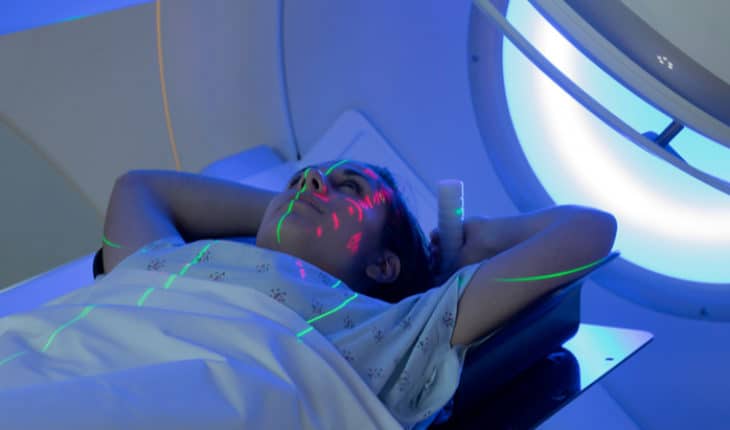Devastating mental health toll of sarcoma cancer worryingly high across the UK, charity Sarcoma UK warns:
Even prior to the Covid-19 pandemic, one in four (25%) patients who responded to Sarcoma UK’s National Sarcoma Survey 2020 [1] said their mental health had been ‘severely affected’ as a result of being diagnosed and treated for sarcoma, an aggressive but little understood type of cancer. Almost all (90%) patients said their mental health had been ‘negatively affected’.
Shockingly, a quarter (24%) of carers and family members of sarcoma patients said they spent 50 hours or more in a week – more than a full-time job – providing care and support to the patient. [2] Additionally, one in five (18%) carers or family members had to stop work or education permanently in order to care for their loved one with sarcoma.
Almost all carers (94%) said that they felt either depressed or anxious more often or constantly since the sarcoma diagnosis.
Lisa Hall, 57, was diagnosed with a form of bone cancer known as dedifferentiated chondrosarcoma in July 2019. In January 2020, she had an amputation of her left arm and shoulder following multiple recurrences. She says: ‘I had never heard of sarcoma before, it genuinely felt like no one had and that made me feel so isolated. Even my GP had no real experience of it. My mind was in complete turmoil. The independent, outgoing, chatty woman I used to be was gone.
‘They said to me the only way forward was amputation. I remember thinking to myself at what point do I give up? My whole world was just spinning and it felt like I had lost my personality. The independent, outgoing, chatty woman I used to be was gone. It’s so important to speak to people with knowledge, knowing that that there are people at the end of a support line who can help, that’s what made the difference.’
Fifteen people a day are diagnosed with sarcoma in the UK. Treatments for sarcoma, which can develop almost anywhere in the body’s bone and soft tissue, are often limited to surgery, chemotherapy and a very small number of drugs. Sarcoma lags behind many other cancers that have newer, more targeted treatments available.
Poor public and healthcare professional awareness also contributes to anxiety about living with this cancer. Three quarters of UK adults do not know what sarcoma is [3], whilst a report released in June 2020 by Sarcoma UK highlighted that one in three sarcoma patients waited six months from first talking to a healthcare professional to receiving a sarcoma diagnosis .[4]
Sarcoma patients have also frequently reported poorer care experience than those with other cancer diagnoses over the last seven years, according to NHS England’s annual National Cancer Patient Experience Survey.
Although these effects of living with sarcoma are not exclusive to this cancer type, the scale and range at which they do has long-term mental health consequences on sarcoma patients and carers in the UK. Getting the right support at the right times can allow patients to better understand sarcoma and ask the right questions. Yet 45% of patients said they were not given enough information when they were first diagnosed, with a similar number (two in five patients), feeling they were not given enough emotional support throughout the duration of their treatment.
Dr Rachel Taylor, Director of the Centre for Nurse, Midwife and Allied Health Profession Led Research (CNMAR) at University College London Hospitals NHS Foundation Trust, says: ‘Our research funded by Sarcoma UK exploring the experiences of patients living with a sarcoma diagnosis has shown us the full extent of the emotional impact sarcoma has throughout a patient or their carers’ journeys.
‘Having an uncommon cancer can present challenges, such as being diagnosed early, making sure patients are being treated by the right specialist team and the fear from patients that their sarcoma could come back. We can’t fix these problems overnight, but we are working with patients and healthcare teams to develop ways for helping patients manage these fears.’
Richard Davidson, Chief Executive of Sarcoma UK says: ‘It’s heart-breaking hearing time and again how sarcoma has devastated the lives of patients, carers and families. We have a unique coming together of multiple factors, a cancer that few have heard of, frequent difficulty in getting diagnosed, limited treatment options and a lack of emotional support. That’s the harsh reality faced by so many people affected by sarcoma and it has to change.
‘The pandemic and the subsequent disruption to cancer services will have only made matters worse. Mental health support should be available at regular stages throughout diagnosis and treatment for both patients and carers. They should be signposted to support, emotional or even financial, that is available to them. It’s telling that when we asked family and carers what the biggest improvements to sarcoma services should be, support was the most popular choice.’
The full report, ‘Impact of Sarcoma: The National Sarcoma Survey 2020’ is available now at
Additional findings from the report include:
- More than half of the sarcoma patients asked said anxiety affected their lives day to day, the largest worry being whether their cancer would come back.
- Although some support is available in the form of local support groups, most patients were not made aware of them. More than half (52%) were not told by their medical teams about local cancer groups or charities, and of the remaining half, only 54% were told about a sarcoma-specific group.
Sarcoma symptoms can be vague – often a growing, possibly painful lump, or bone pain if it is in the bone. There are more than 100 sub-types of sarcoma, with no ‘one size fits all’ treatment for it, so catching sarcoma early is imperative, especially given that the current five-year survival rate is only 55%.
Sarcoma UK is a national charity that funds vital research, offers support for anyone affected by sarcoma cancer and campaigns for better treatments. It is one of the largest funders of sarcoma research in the UK, having funded 56 research projects and invested over £3.5 million into scientific and medical research at institutions across the UK to better understand sarcoma and look for kinder, more effective treatments. sarcoma.org.uk
REFERENCES
[1] The National Sarcoma Survey 2020 was conducted online by Sarcoma UK between November 2019 and February 2020. Sample: 1107 sarc
[2] When talking about cancers as a whole, only one in six (16%) carers spend 50 hours or more a week caring for someone with cancer, according to the 2016 report by Macmillan Cancer Support, ‘Under Pressure: The Growing Strain on Cancer Carers’.
[3] The awareness survey for Sarcoma UK was carried out online by YouGov Plc on 1-2 April 2020. Sample: 2,007 adults. The figures have been weighted and are representative of all GB adults (aged 18+).
[4] Demand early diagnosis, save lives’, Sarcoma UK, June 2020,
- New lipid-based pathway discovered as key to memory formation - 25th June 2025
- Crucial link could explain how Alzheimer’s takes hold - 25th June 2025
- Understanding Your Mind Can Improve Daily Life - 25th June 2025







